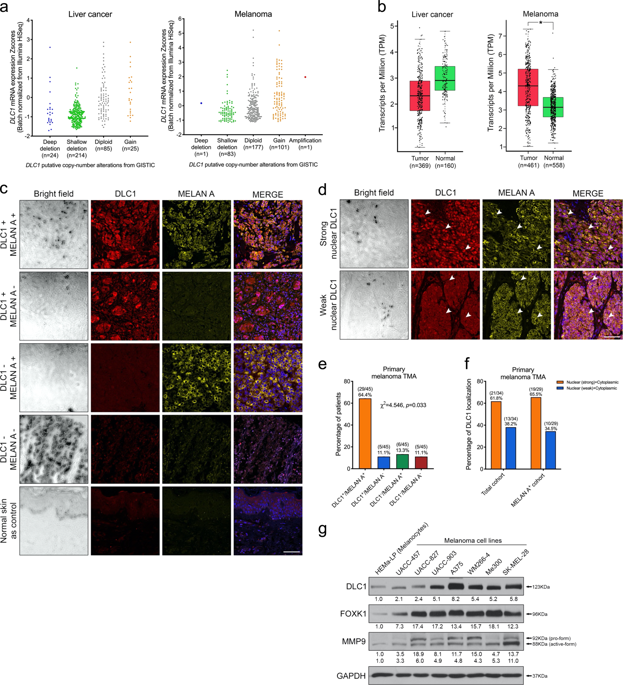Our official English website, www.x-mol.net, welcomes your
feedback! (Note: you will need to create a separate account there.)
Nuclear DLC1 exerts oncogenic function through association with FOXK1 for cooperative activation of MMP9 expression in melanoma.
Oncogene ( IF 6.9 ) Pub Date : 2020-03-25 , DOI: 10.1038/s41388-020-1274-8 Xintao Yang 1, 2 , Feng Hu 1, 2 , Jessica Aijia Liu 3 , Shan Yu 4 , May Pui Lai Cheung 1, 2 , Xuelai Liu 5 , Irene Oi-Lin Ng 6 , Xin-Yuan Guan 7 , Kelvin K W Wong 8 , Rakesh Sharma 8 , Hong Lok Lung 9 , Yufei Jiao 10 , Leo Tsz On Lee 4, 11 , Martin Cheung 1, 2
Oncogene ( IF 6.9 ) Pub Date : 2020-03-25 , DOI: 10.1038/s41388-020-1274-8 Xintao Yang 1, 2 , Feng Hu 1, 2 , Jessica Aijia Liu 3 , Shan Yu 4 , May Pui Lai Cheung 1, 2 , Xuelai Liu 5 , Irene Oi-Lin Ng 6 , Xin-Yuan Guan 7 , Kelvin K W Wong 8 , Rakesh Sharma 8 , Hong Lok Lung 9 , Yufei Jiao 10 , Leo Tsz On Lee 4, 11 , Martin Cheung 1, 2
Affiliation

|
A Rho GTPase-activating protein (RhoGAP), deleted in liver cancer 1 (DLC1), is known to function as a tumor suppressor in various cancer types; however, whether DLC1 is a tumor-suppressor gene or an oncogene in melanoma remains to be clarified. Here we revealed that high DLC1 expression was detected in most of the melanoma tissues where it was localized in both the nuclei and the cytoplasm. Functional studies unveiled that DLC1 was both required and sufficient for melanoma growth and metastasis. These tumorigenic events were mediated by nuclear-localized DLC1 in a RhoGAP-independent manner. Mechanistically, mass spectrometry analysis identified a DLC1-associated protein, FOXK1 transcription factor, which mediated oncogenic events in melanoma by translocating and retaining DLC1 into the nucleus. RNA-sequencing profiling studies further revealed MMP9 as a direct target of FOXK1 through DLC1-regulated promoter occupancy for cooperative activation of MMP9 expression to promote melanoma invasion and metastasis. Concerted action of DLC1-FOXK1 in MMP9 gene regulation was further supported by their highly correlated expression in melanoma patients' samples and cell lines. Together, our results not only unravel a mechanism by which nuclear DLC1 functions as an oncogene in melanoma but also suggest an unexpected role of RhoGAP protein in transcriptional regulation.
中文翻译:

核DLC1通过与FOXK1结合发挥致癌作用,从而协同激活黑色素瘤中MMP9表达。
已知在肝癌1(DLC1)中缺失的Rho GTPase激活蛋白(RhoGAP)在多种癌症类型中均起着抑癌作用。但是,DLC1是黑色素瘤中的抑癌基因还是癌基因仍有待阐明。在这里,我们揭示了在大部分黑色素瘤组织中都定位于细胞核和细胞质中都检测到了高DLC1表达。功能研究表明,DLC1是黑色素瘤生长和转移的必要条件和充分条件。这些致癌事件是由核定位的DLC1以RhoGAP独立的方式介导的。从机理上讲,质谱分析确定了DLC1相关蛋白FOXK1转录因子,该蛋白通过将DLC1转移并保留在细胞核中来介导黑色素瘤的致癌事件。RNA序列分析研究进一步揭示了MMP9作为FOXK1的直接靶标,通过DLC1调控的启动子占用来协同激活MMP9表达,从而促进黑素瘤的侵袭和转移。它们在黑素瘤患者样品和细胞系中的高度相关表达进一步支持了DLC1-FOXK1在MMP9基因调控中的协同作用。总之,我们的结果不仅揭示了核DLC1在黑色素瘤中作为癌基因起作用的机制,而且还暗示了RhoGAP蛋白在转录调控中的出乎意料的作用。它们在黑素瘤患者样品和细胞系中的高度相关表达进一步支持了DLC1-FOXK1在MMP9基因调控中的协同作用。总之,我们的结果不仅揭示了核DLC1在黑色素瘤中作为癌基因起作用的机制,而且还暗示了RhoGAP蛋白在转录调控中的出乎意料的作用。它们在黑素瘤患者样品和细胞系中的高度相关表达进一步支持了DLC1-FOXK1在MMP9基因调控中的协同作用。总之,我们的结果不仅揭示了核DLC1在黑色素瘤中作为癌基因起作用的机制,而且还暗示了RhoGAP蛋白在转录调控中的出乎意料的作用。
更新日期:2020-03-25
中文翻译:

核DLC1通过与FOXK1结合发挥致癌作用,从而协同激活黑色素瘤中MMP9表达。
已知在肝癌1(DLC1)中缺失的Rho GTPase激活蛋白(RhoGAP)在多种癌症类型中均起着抑癌作用。但是,DLC1是黑色素瘤中的抑癌基因还是癌基因仍有待阐明。在这里,我们揭示了在大部分黑色素瘤组织中都定位于细胞核和细胞质中都检测到了高DLC1表达。功能研究表明,DLC1是黑色素瘤生长和转移的必要条件和充分条件。这些致癌事件是由核定位的DLC1以RhoGAP独立的方式介导的。从机理上讲,质谱分析确定了DLC1相关蛋白FOXK1转录因子,该蛋白通过将DLC1转移并保留在细胞核中来介导黑色素瘤的致癌事件。RNA序列分析研究进一步揭示了MMP9作为FOXK1的直接靶标,通过DLC1调控的启动子占用来协同激活MMP9表达,从而促进黑素瘤的侵袭和转移。它们在黑素瘤患者样品和细胞系中的高度相关表达进一步支持了DLC1-FOXK1在MMP9基因调控中的协同作用。总之,我们的结果不仅揭示了核DLC1在黑色素瘤中作为癌基因起作用的机制,而且还暗示了RhoGAP蛋白在转录调控中的出乎意料的作用。它们在黑素瘤患者样品和细胞系中的高度相关表达进一步支持了DLC1-FOXK1在MMP9基因调控中的协同作用。总之,我们的结果不仅揭示了核DLC1在黑色素瘤中作为癌基因起作用的机制,而且还暗示了RhoGAP蛋白在转录调控中的出乎意料的作用。它们在黑素瘤患者样品和细胞系中的高度相关表达进一步支持了DLC1-FOXK1在MMP9基因调控中的协同作用。总之,我们的结果不仅揭示了核DLC1在黑色素瘤中作为癌基因起作用的机制,而且还暗示了RhoGAP蛋白在转录调控中的出乎意料的作用。









































 京公网安备 11010802027423号
京公网安备 11010802027423号